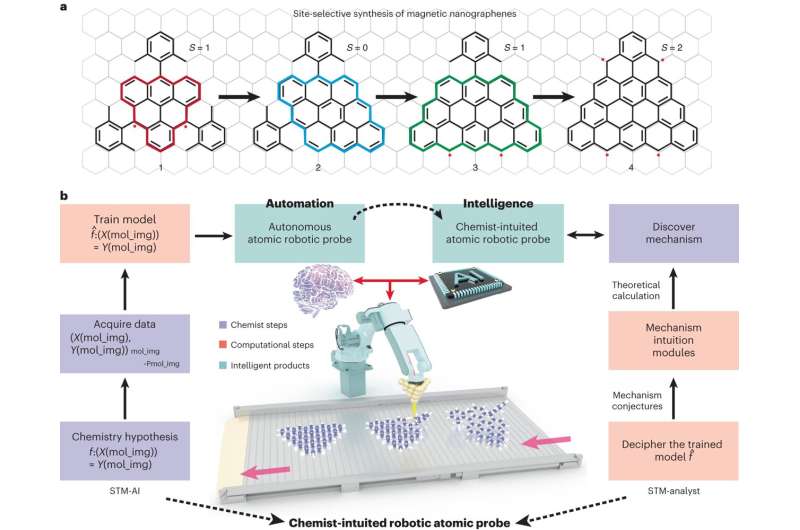
A team of NUS researchers led by
Associate Professor Lu Jiong from the Department of Chemistry and Institute for
Functional Intelligent Materials, together with their international
collaborators, have developed a novel concept of a chemist-intuited atomic robotic
probe (CARP).
This innovation, which uses artificial intelligence (AI) to mimic the decision-making process of chemists, enables the manufacturing of quantum materials with unrivaled intelligence and precision for future quantum technology applications such as data storage and quantum computing.
Open-shell magnetic nanographene is a type of carbon-based quantum material that possesses key electronic and magnetic properties that are important for developing extremely fast electronic devices at the molecular level, or creating quantum bits, the building blocks of quantum computers. The processes used to develop such materials have progressed over the years due the discovery of a new type of solid-phase chemical reaction known as on-surface synthesis.
However, it remains challenging to precisely fabricate and tailor the properties of quantum materials at the atomic level because this requires a higher level of selectivity, efficiency and precision which the on-surface synthesis approach is unable to provide. This limits the applicability of open-shell magnetic nanographene for future technology.
Assoc Prof Lu explains, "Our main goal is to work at the atomic level to create, study, and control these quantum materials. We are striving to revolutionize the production of these materials on surfaces to enable more control over their outcomes, right down to the level of individual atoms and bonds."
The study was conducted in collaboration with Associate Professor Zhang Chun from the NUS Department of Physics and Associate Professor Wang Xiaonan from Tsinghua University.
The research breakthrough was published in Nature Synthesis on 29 February 2024.
Developing a new concept for nanotechnology
By combining scanning probe microscope techniques with deep learning, the research team enabled the microscope to carry out precise fabrication of a carbon-based quantum material called magnetic nanographenes. This innovative approach also allows this "smart" microscope to extract detailed chemical information, aiding in understanding previously unknown mechanisms.
A significant aspect of this new concept is its ability to harness the expertise and intuition of human surface chemists through a deep neural framework within the CARP. This framework enables the microscope to fabricate specific quantum materials while operating in real-time. To achieve this, the research team developed various layers of convolutional neural networks, a type of deep learning model used for image recognition and processing.
The research team then tested the CARP framework by training it using the expert knowledge of site-selective cyclodehydrogenation. Discovered by Dr. Su, site-selective cyclodehydrogenation is a complex but essential method to synthesize nanographenes.
The CARP framework exhibits a satisfactory performance in offline and real-time operations, and it manages to trigger the single-molecule reactions at a scale smaller than 0.1 nanometer. This is the first time a probe chemistry reaction is reported to be assisted by AI.
CARP: From autonomation to intelligence
The research team not only expects the CARP framework to conduct autonomous operations at the atomic scale but aims to maximize the capability of AI to grasp deep information hidden in the database. To achieve this, the team established a learning paradigm to examine the framework's learning outcomes using a game-theory-based approach.
The analysis results indicate that the CARP effectively captured some features that might be crucial for the successful synthesis of nanographene through cyclodehydrogenation, which can be challenging for human operators to notice. The CARP also showed potential in handling versatile probe chemistry reactions when tested with unknown single-molecule reactions.
"Our goal in the near future is to extend the CARP framework further to adopt versatile on-surface probe chemistry reactions with scale and efficiency. This has the potential to transform conventional laboratory-based on-surface synthesis process into on-chip fabrication for practical applications. Such transformation could play a pivotal role in accelerating the fundamental research of quantum matters and usher in a new era of intelligent atomic fabrication," added Assoc Prof Lu.

 Previous page
Previous page Back to top
Back to top







